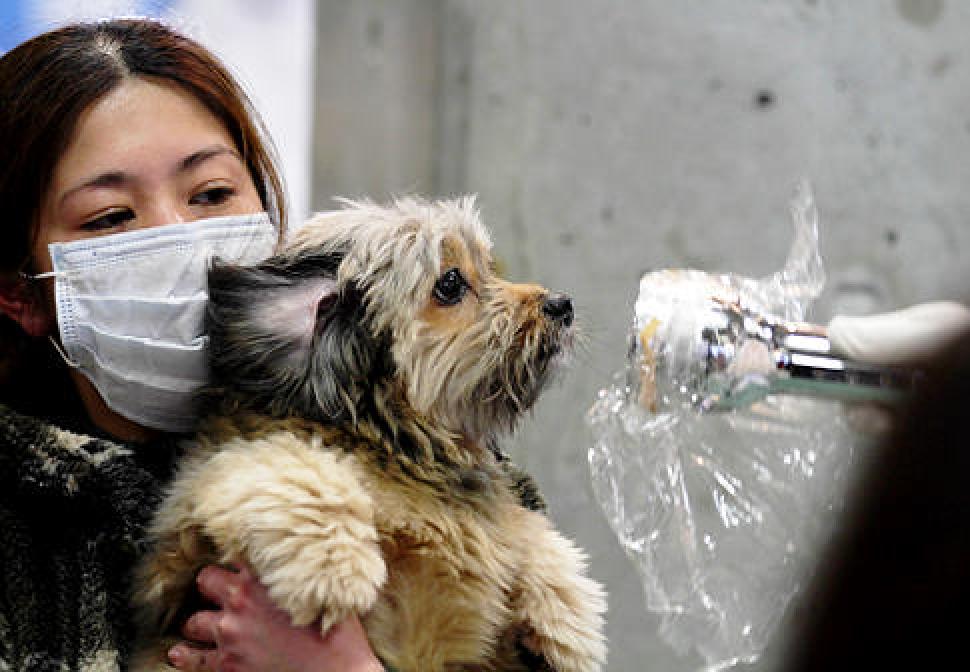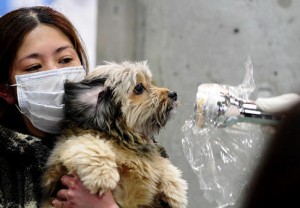The flight from Fukushima – and the grim return

Looking back: A woman holds her dog as they are scanned for radiation in March 2011 at a scanning centre for residents living close to the Fukushima Daiichi nuclear power plant.
By Linda Pentz Gunter The Ecologist
Five years after the Fukushima nuclear disaster began to unfold, the searing psychological effects are still being felt among the 160,000 refugees who fled the fallout, writes Linda Pentz Gunter. But now there’s growing pressure to return to contaminated areas declared ‘safe’ in efforts to whitewash the disaster’s impacts. Why the rush? To clear the way for the 2020 Tokyo Summer Olympics, complete with events in Fukushima City.
“Moving under normal circumstances is a personal decision. Evacuees have no choice. They are forced to flee.”
Yoshiko Aoki knows exactly what this feels like. A petite, older woman, Aoki, like almost 160,000 of her fellow Japanese citizens, was one of those forced from her hometown when the Fukushima-Daiichi nuclear disaster of 11th March 2011 began to unfold.
She still lives in exile.
Aoki has been traveling the world to speak out for Fukushima refugees, as she did at a London event in January hosted by Nuclear Free Local Authorities, Green Cross and the Nuclear Consulting Group.
Aoki is from Tomioka, situated 10km from the Fukushima plant and one of the ghost towns that may be reopened by governmental decree in March 2017 and declared ‘safe.’ She now runs a community center for Fukushima evacuees in Koriyama.
When you flee like that, Aoki says, with the threat of radiation literally hanging over you, “you leave your home, your land, you lose your job, you are separated from family members, and your animals are abandoned or killed before you leave.”
The cries of abandoned animals gave voice to the Fukushima tragedy
It was those animals left abandoned who first gave voice to the tragedy. Harrowing videos of starving, dying cows in the Fukushima ‘zone’ emerged in the first weeks following the disaster, a searing lament of unbearable agony. Many of these videos are so painful to watch that they come with a warning of the horrors ahead.
For some, the suffering of the animals was too much. In Alone in the Zone, a 2013 video report from Vice, Naoto Matsumura, then 53 and also from Tomioka, describes how he eventually left his family to return home and look after the animals there who still survived.
But Matsumura and his family were turned away by a relative to whom they fled for refuge. “She wouldn’t even let us in. She said we were contaminated by radiation”, he related.
Fukushima evacuees are the new Hibakusha
Such misconceptions were widespread. Fukushima evacuees had become the new Hibakusha, the name given to survivors of the Hiroshima and Nagasaki bomb blasts, many of whom were stigmatized and treated as outcasts.
After finding no room at shelters either, Matsumura took the decision to return to Tomioka alone. When he saw the starving animals he said he had no choice but to stay on.
Matsumura’s story is less uncommon than one would expect. A 2013 ITN news feature profiled Kago Sakamoto, then 58, who refused to abandon his animal sanctuary situated less than 12 miles from the Fukushima nuclear plant
Although he lives there illegally, Sakamoto survives on charitable in-kind donations from supporters. The older men are gambling that any radiation-borne disease will outlive them anyway, given the long latency period for illnesses like leukemia that can take a couple of decades or more to manifest.
The elderly want to die where they were born
Indeed, statistics indicate that it is the retired and the elderly who have been willing to return from exile so far. Even though studies show that reliable decontamination is unlikely and will not be long-lasting, the elderly, as Aoki explained it, “want to die where they were born and not die in an unfamiliar place.”
Dr. Ian Fairlie, writing in The Ecologist last August, estimates that as many as 2,000 people have already died due to the stress of evacuation itself.
“The uprooting to unfamiliar areas, cutting of family ties, loss of social support networks, disruption, exhaustion, poor physical conditions and disorientation can and do result in many people, in particular older people, dying”, Fairlie wrote.
Some who decline to return are ostracized by others, Aoki said. “They are accused of abandoning their homeland.” Some government officials have even tried to position the return to previous exclusion zones as some kind of patriotic duty.
That patriotic duty will be center stage in the lead-up to the 2020 Summer Olympic Games to be hosted in Tokyo. Between now and then, a comprehensive public relations effort must sweep aside all doubts about radiation risks.
Fukushima will bid for an Olympic event
In a blatant example of the depth of denial about the true extent of the disaster, Fukushima City hopes to be an Olympic venue. As Fukushima City official Hiroaki Kuwajima told AFP:
“If baseball and softball return to the Olympics, and preliminary games are played outside Tokyo, then we hope to be able to stage games. We are still in the process of recovery from the disaster and it would be a dream to have world-class athletes play here.”
Kuwajima and other officials are positioning the pariah status of Fukushima Prefecture as “harmful rumors” that can be dispelled by moving refugees back, encouraging Olympic events and luring young people into the workforce, essential to re-boot the region’s crushed economy.
“The Governor of Fukushima spoke about a safe Fukushima”, Aoki said. “We want it to become safe. But our thoughts and reality are not one and the same.”
Not everyone is cooperating. Before the Fukushima disaster, there was a cultural lockstep when it came to trust in government. But with unprecedented anti-nuclear demonstrations and the revelations of government and industry collusion, the traditional culture of group obedience has eroded to some degree. But it has not entirely vanished.
Voices of opposition dismissed as ‘extremists’
“There persists an anti-scientific stance and group mentality”, said Dr. Tetsunari Iida, executive director of the Institute for Sustainable Energy Policies in Japan, speaking at the same London conference as Aoki. “People are told they shouldn’t be expressing fearfulness. People who speak up are dismissed as extremists.”
Minamisoma city, located 14-38 km north of the Fukushima nuclear site, was one of the communities worst hit by radiation fallout. About 42% of all Fukushima Prefecture evacuees were former residents of the city. But while the Japanese Nuclear Emergency Response Headquarters has declared the city safe for residents to return, only a little over half of the former population has gone back, about 50% of whom are senior citizens.
Those who remain away – still around 110,000 people according to Aoki – lost many tangibles in their lives, but also, she says, something more fundamental: “People must not lose their dignity. How can we possibly construct something that will annihilate dignity?”
That decimation of spirit along with land and livelihood, prompted Aoki to repeat the warning she gave when she visited the Wylfa nuclear site in Wales, where two reactors are shut down but a new one is proposed. Like a Cassandra of the East, she intones:
“Please learn from Fukushima. Please learn from our mistake. You don’t want to apologize to your own children, to your grandchildren, for making the choice before they were even born.”
That choice was the blunder of nuclear power, one for which Japan is paying a terrible and still incalculable price.
Linda Pentz Gunter is the international specialist at Beyond Nuclear, a Takoma Park, MD, USA environmental advocacy group.










Leave a Reply